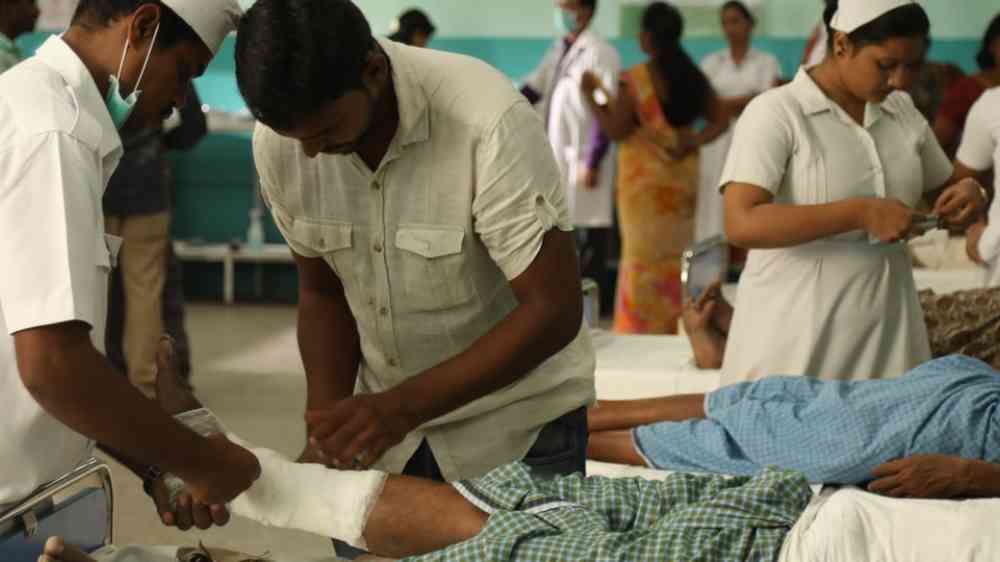Health systems resilient to climate change, an opportunity for sustainable human development

Climate change is already impacting various aspects of our lives, including agricultural crops yield, labour productivity, and people´s health and well-being. In Latin America and the Caribbean (LAC), people are experiencing heatwaves, heavy precipitation events, sea level rise, and ecosystem changes. However, not all of us feel the impacts of a changing climate in the same way.
Four critical factors that exacerbate the impacts of climate change on population health, especially among the most vulnerable, are low governance and limited policies on climate preparedness and adaptation, deep social inequities, high levels of poverty and labor informality and overwhelmed health systems.
Significant communicable and non-communicable disease burdens, along with historically underfunded and understaffed systems, have made it difficult to provide adequate health services and meet the needs of the population in LAC. Unfortunately, considering climate change projections and current climate policies and the current climate resilience of health systems, the future scenario is even more devastating in terms of disease morbidity and mortality , which will further strain health systems that are already overburdened.
In the 2023 version of Health at a Glance: Latin America and the Caribbean, we analyzed the climate resilience of health systems in LAC countries based on the World Health Organization (WHO) building blocks. Although some progress has been made in strengthening health systems, there are many opportunities for improvement.
How are health and climate-related in Latin American and the Caribbean countries?
While countries recognize that the health sector is highly vulnerable to climate change, there is less evidence on context-specific policies and plans that integrate climate adaptation actions to strengthen health systems. For example, only four LAC countries have fully developed national health and climate plans or national health adaptation plans, demonstrating the limited capacity, coordination, and intersectoral collaboration currently in place.
Healthcare workers are key in the functioning of health systems and their resilience; however, training opportunities on climate and health are still scarce and informal. Capacity to communicate with healthcare workers during a public health emergency is extremely weak in LAC, with Argentina, Peru, Chile, Mexico, and Saint Vincent and the Grenadines being the best prepared.
Health information systems support decision-making by providing timely data sharing and analysis, vital when dealing with the impacts of climate change. The Caribbean is more advanced than the rest of LAC and has structures already in line with what is needed, but more capacities and resources are needed. As of 2022, most of the countries had performed climate vulnerability and adaptation assessments; however, greater standardization, dissemination, and application of the findings at local levels are needed.
As climatological conditions are changing and driving increases in vector-borne diseases, surveillance and laboratory capacity in LAC should improve. Overall, surveillance systems for infectious diseases are well-established but there are significant differences between countries. For example, in 2020, 30 countries reported cases of dengue, but only 15 confirmed the serotype, limiting further public health interventions. Also, mental health surveillance is an important challenge across the region, restricting the understanding of the magnitude and severity of these illnesses, which are exacerbated by climate change impacts.
Early warning systems and risk communication plans vary between countries. In the Caribbean, these systems are relatively well-established; however, in other countries, they are not in place yet, leaving people without the opportunity to be timely and adequately informed. Only six countries have publicly reported having climate-informed early warning systems for vector-borne diseases, despite endemic and emerging outbreaks of mosquito-borne diseases across the region.
Two ways to strengthen climate-resilient health systems:
- Financial resources. There are still few climate change and health projects financed by international funds, which are scarcely complemented by national investments. For example, The Bahamas, Belize, Colombia, Grenada, Guatemala, Guyana, Jamaica, Peru, and Saint Kitts and Nevis have been receiving international funds to support climate change and health adaptation plans. In addition, the Green Climate Fund Readiness Programme has provided financial support in the Caribbean to strengthen the health sector’s resilience. The World Bank Group has also been one of the largest multilateral financier of climate action in developing countries, delivering a record USD 31.7 billion in climate finance in fiscal year 2022.
- Strengthen intersectoral collaboration at a national and local levels. Countries in the LAC region will become climate resilient by, for example, investing in early warning systems for vector-borne diseases, infrastructure that can withstand extreme weather events, and improving air quality monitoring and control. Additionally, there is a need for greater collaboration between health systems and other health-determining sectors, such as agriculture and urban planning, to address the root causes of climate change and its impact on health.
By building climate-resilient health systems, the region will better respond to the immediate health impacts of climate change and lay the groundwork for better human development in the long term. A climate-resilient health system can provide a stable foundation for economic growth, social cohesion and inclusion, and environmental sustainability, all of which are crucial for LAC countries development and their contributions to the global agenda on climate and health.